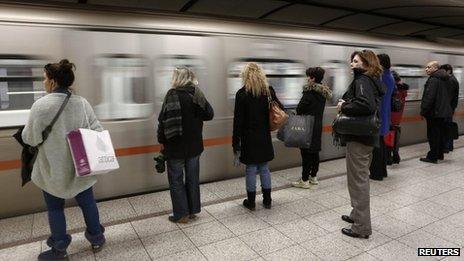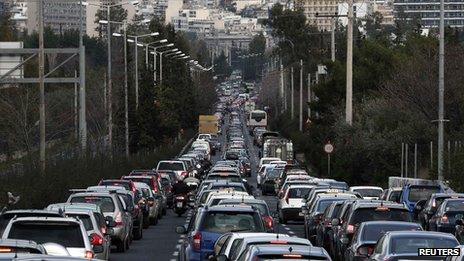Greece crisis: Athens 10-day metro strike ends
- Published
Police stormed a metro train depot to break up a sit-in, as Claire Brennan reports
A 10-day strike by metro workers in the Greek capital, Athens, has ended after the government threatened them with arrest unless they returned to work.
Although a protest by some public transport workers continued, the metro reopened at around 15:00 (13:00 GMT).
Police earlier stormed a metro depot in the city, breaking up a workers' sit-in. Traffic was gridlocked as commuters struggled to work by car.
Athens is trying to implement austerity measures unpopular with trade unions.
The strike action over planned pay cuts had crippled the underground system as the Athens metro, trams and suburban railway serve more than 1.1 million passengers daily.
"I am pleased that the urban rail workers restarted the network, and passengers are even more pleased," Transport Minister Costis Hadzidakis said.
But Athens's transport network continued to suffer disruption on Friday evening despite metro services resuming, as bus workers remained on strike in solidarity with their union colleagues.
And various transport workers were preparing to march towards Athens' main Syntagma Square later - the scene of sometimes-violent protests in recent years.
'Exploring legal options'
The civil mobilisation order issued by the government on Thursday threatened metro workers with dismissal, arrest and even imprisonment.
It was the first time the conservative-led coalition had invoked a 2007 emergency law to deal with "peace-time emergencies".

The Athens metro, trams and suburban railway serve 1.1 million people daily
Such emergency legislation has only been used nine times since the collapse of Greece's military dictatorship in 1974.
"The workers who were handed the notice didn't have a choice," said Manthos Tsakos, general secretary of the main metro workers' union. "We are exploring legal options."
Other transport workers had joined the striking metro workers in solidarity on Friday and a big rally was planned to protest against a public sector unified wage scheme that would see their salaries reduced by up to 25%.
The police operation at the metro depot took place shortly before 04:00, with about 100 riot police officers entering the area where workers had barricaded themselves overnight.
A police spokesman told the BBC three people had been arrested and subsequently released.
'No repeats'
Under the terms of its massive international bailout, the Greek government has had to accept substantial spending cuts, such as redundancies and pay freezes in the public sector, and reduced pensions.
The austerity programme has had a major impact on the economy, with the unemployment rate hitting 26.8% earlier this month - the highest figure recorded in the EU.

Athens commuters had faced gridlock on the roads on Friday morning
But Prime Minister Antonis Samaras delivered a tough message to Greeks on Thursday evening.
"The Greek people have made huge sacrifices and I cannot allow any exceptions," he said.
Referring to the metro strike, he warned: "Everyone should understand we will not repeat the mistakes of the past."
His junior coalition partner, the Democratic Left, criticised the use of the civil mobilisation order as "an extreme choice" and urged more dialogue. But party sources quoted by the Kathimerini newspaper said the issue would not split the three-party coalition.
Socialist Pasok leader Evangelos Venizelos backed Mr Samaras's decision, calling the strike "unacceptable".
Greece's colossal debt mountain and struggle to reduce it fuelled speculation last year that Greece might have to abandon the euro.
So far, the European Central Bank, International Monetary Fund, and the European Commission have pledged a total of 240bn euros ($315bn; £196bn) in rescue loans, of which Greece has received more than two-thirds.